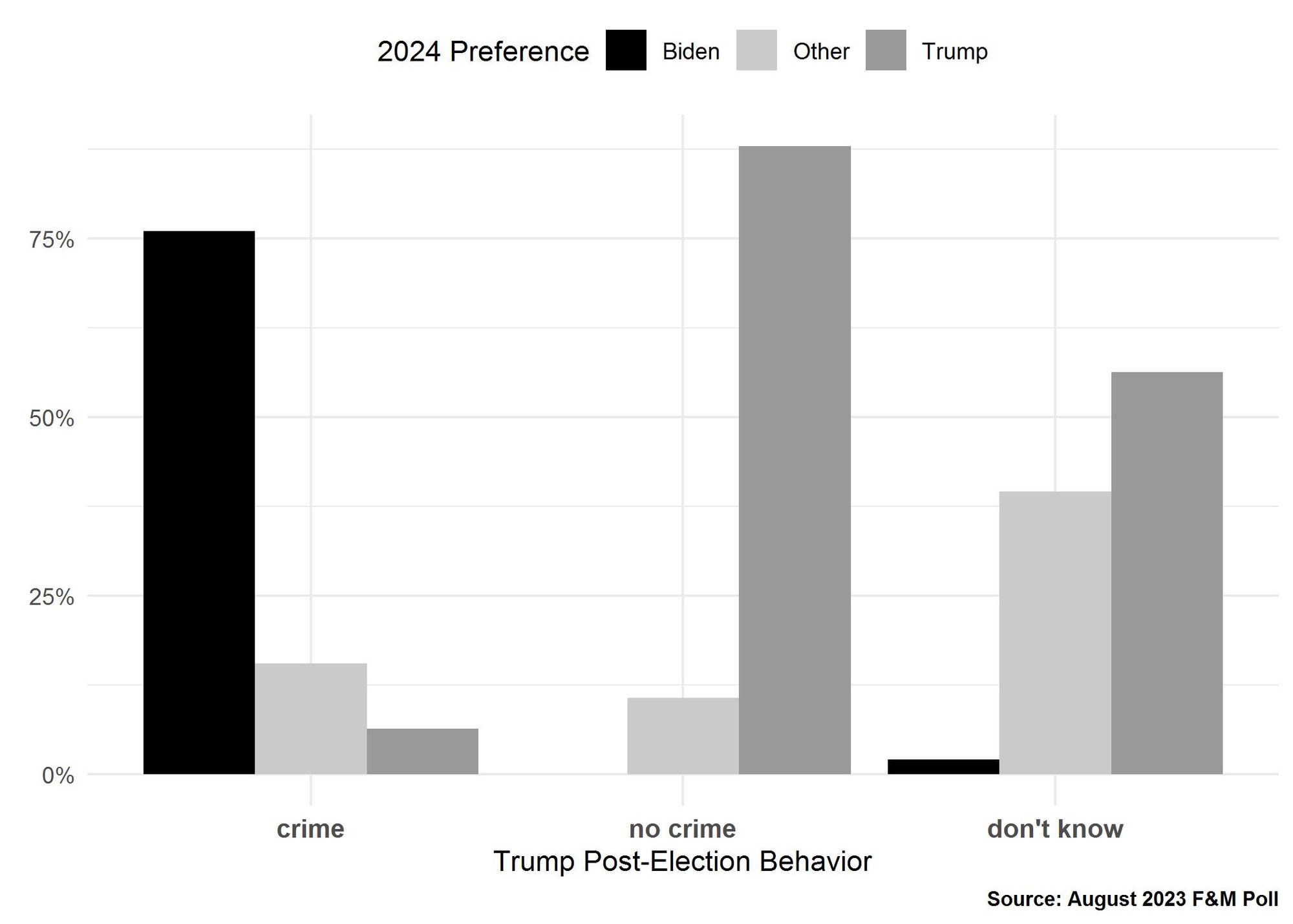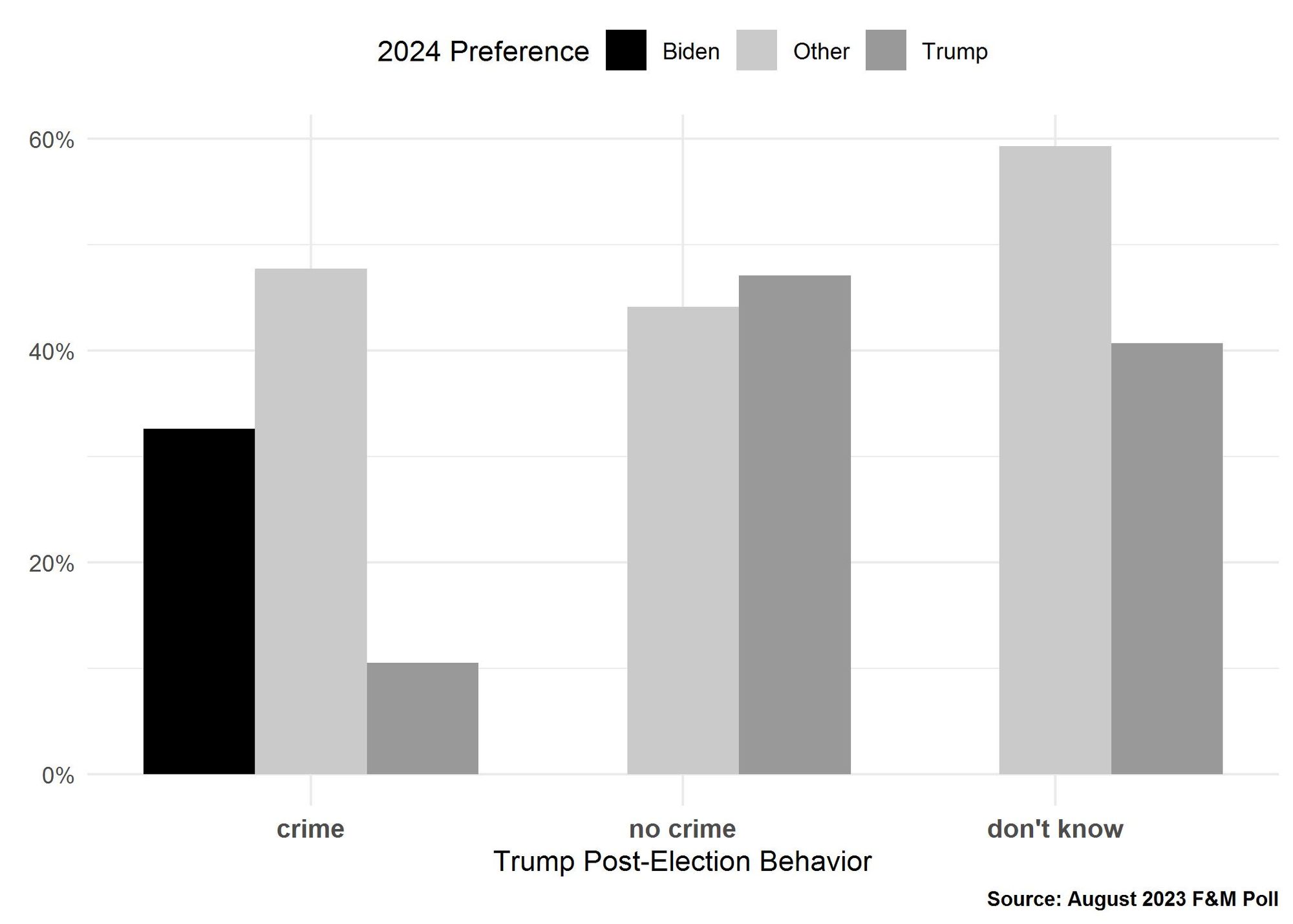The Trump Indictments
How will the Trump indictments factor into voters' preferences in the 2024 election? Right now, the data suggest a close race, with few historical precedents to guide our understanding of what might happen.
Dear Readers,
This month we take a closer look at data from our August 2023 F&M Poll, looking specifically at how the Trump indictments may factor into voters' preferences in the 2024 election. The data right now suggest a close race with few historical precedents to guide our understanding of what might happen.
Thank you for reading,
Berwood Yost
Pundits believe the indictments against former President Trump may both help and hurt him in the 2024 election. They believe the indictments have helped Mr. Trump with Republican voters and improved his chances of winning the Republican presidential primary race. Our August poll showed his lead increasing from 6% in April to 18% in August, which mirrors the patterns in other state and national polls and offers substantive evidence about the effects of the indictments on Republican primary voters. These same pundits also claim the indictments are likely to diminish his appeal to the broader electorate and doom his chances of winning a general election. While the primary polling data supports the first point, does it also support the second?
A Clear Partisan Response
One of the questions included in the August 2023 F&M Poll shows why many observers believe the indictments will ultimately harm Mr. Trump in the general election--most (58%) of the state’s registered voters believe his actions after the 2020 election constituted serious crimes. Not surprisingly, there is a strong partisan divide on this question, with most registered Democrats (89%) and independents (63%) thinking he committed serious crimes, compared to only one in five (20%) Republicans. Pundits reasonably assume that anyone who thinks the former president engaged in criminal acts won’t support his candidacy in the general election. That a large number of independents believe Mr. Trump’s acts were criminal further reinforces this perspective.
As you might expect, voter preferences are strongly related to perceptions about the seriousness of Mr. Trump’s actions and reflect the partisan divisions on this issue. Three in four (76%) of those who believe Mr. Trump committed serious crimes say they plan to vote for President Biden. But most of those who say his actions were not a crime or that they don’t know if they were a crime plan to vote for Mr. Trump in 2024. In fact, no one who thinks Mr. Trump’s behavior was legal plans to vote for President Biden (see Figure 1). The President holds an advantage in a head-to-head match up against the former president, 42% to 40%. But, many voters (16%) are looking for an alternative to both candidates (of course this could be a product of way-too-early polling: in April, 29% were looking for someone else or didn’t know).

What makes any judgment about the effects of the indictments as much a guess as an informed opinion is that one in four (23%) voters in the August poll viewed both candidates unfavorably. This resembles the 2016 election when a large share of voters (16%) had an unfavorable opinion of both candidates on Election Day (Yost, Redman, Thompson, 2017); the exit polls showed that these voters broke for Mr. Trump 56% to 31%. In 2020, less than one in ten (7%) voters had an unfavorable opinion of both candidates.[1]
These "disapprovers" may be vital to the 2024 outcome: two in three (68%) of those who plan to vote for a third-party candidate disapprove of both President Biden and Mr. Trump. Reflecting the current President’s weakness, even those disapprovers who feel that Mr. Trump committed a serious crime are more likely to vote for a third party candidate than for Mr. Biden (see Figure 2). In fact, none of the disapprovers who believe that Mr. Trump committed no serious crimes plan to vote for President Biden.

Handicapping the Presidential Race in Pennsylvania One-Year Out
No one should discount the possibility that Donald Trump can win the state of Pennsylvania in 2024. If this election follows normal patterns, President Biden’s performance will be a main consideration for most voters, and right now those voters aren’t excited about what they’ve seen from him. Fewer than one in three (30%) registered voters in Pennsylvania believes President Biden is doing an “excellent” or “good” job as president, and he is viewed more unfavorably (58%) than favorably (40%) by the state’s voters.
The President is also on the wrong side of an enthusiasm gap—in 2020, four in five (78%) of those who planned to vote for Mr. Trump were voting for him, not against Joe Biden, but more than half (54%) of Biden’s supporters were voting against President Trump. The President’s ability to improve public perceptions about his performance and generate enthusiasm for his candidacy over the coming year is going to matter at least as much as the Trump indictments.
We also should not discount the possibility that President Biden wins by a larger margin than he did in 2020, assuming Mr. Trump is the Republican candidate. President Trump is less well liked than he was in 2020, and his on-going legal problems will affect his campaign in unknown ways. There are moderate Republicans in the state who would really prefer someone else, and they could once again support Biden while voting for Republicans in other races. Abortion rights played a major role in the 2022 mid-terms and could do so once again in favor of Democratic candidates.
Suggesting that anything can happen in the 2024 election may be anti-climactic, but it acknowledges how much remains to be settled over the next year. Normally we can use data from polls to supplement the mental models we have about what will be important to voters when they choose their presidential candidate. Partisanship, an incumbent’s job approval ratings, and economic conditions are what we often consider when trying to understand who will win, but these traditional ways of handicapping an election seem to be missing something right now. We have no real precedent for understanding whether or how much the Trump indictments will factor into voter decisions. Nor do we really know how to account for the effects of the Dobbs decision on voter preferences and turnout. We also aren’t sure what to do with the pool of dissatisfied voters who are looking for other alternatives, nor do we know what those alternatives will be. Perhaps all we can be confident about right now is that Pennsylvania will be central to the story of the 2024 election, however it unfolds.
[1] In 2012, only 3% of voters in Pennsylvania had an unfavorable opinion of both presidential candidates.
Franklin & Marshall College Poll Newsletter
Join the newsletter to receive the latest updates in your inbox.
